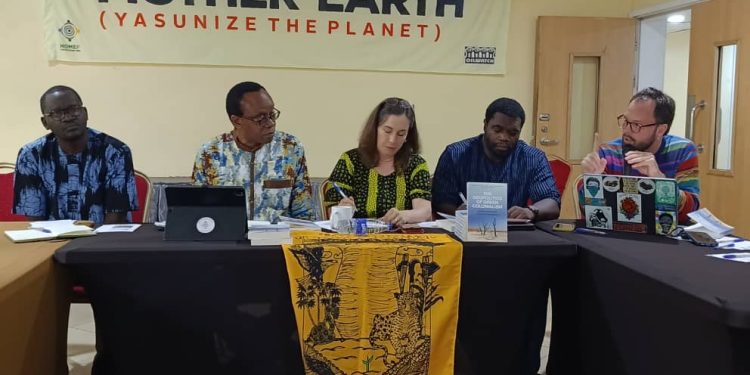Environmental activists and scholars have decried how transnationals are exploiting countries in the Global South through extractivism and false solutions, and are only interested in making profits at the detriment of the people.
The activists and scholars documented their positions in a book titled ‘The Geopolitics of Green Colonialism: Global Justice and Ecosocial Transitions’ publicly presented in Lagos by the Health of Mother Earth Foundation (HOMEF).
Dr Nnimmo Bassey, Executive Director of HOMEF explained that green colonialism is still grappling the world, especially in the Global South.
The top environmentalist said, “the view of Africa as a vast landscape with limitless resources to be exploited got rigidly entrenched in the colonial mindset and drove concepts of conservation that ignored the true cause of the degradation that unfolded from their mindless exploitation and consumption.”
Dr Bassey said “climate action has become climate fiction” adding that some of the targets for climate solutions are being moved to decades ahead which means the “youths will be the ones to bear the burden later in future.”
Also speaking on false solutions, Prof Breno Bringel, Brazilian activist-scholar who is also a contributor to the book, shared that “green extractivism is the name given to new extractive ventures that disrupt ecosystems and communities to provide resources to companies and countries for climate change mitigation and adaptation policies.”
Bringel noted that green extractivism does not address the root cause because it isolates the need for decarbonisation from the metabolism of nature.
He stressed that it is important to unmask the concept of green colonialism, the impacts in countries across the Global South and for people to also understand the hypocrisy behind it.
Miriam Lang, an activist academic and Professor of Environment and Sustainability from Ecuador, said Global Power countries have turned countries in the Global South to the dumpsite of energy transitions, with Africa becoming ‘the destination of digital trash’.
Lang recommended systemic alternatives, because according to her “the crises that we are facing is not only ecological, it is also political.”
Ronald Ngam, a Climate Justice Activist spoke about the alternatives that exist and the need for people to “start demanding reparation and the reparation does not have to be money, it can be done in form of investments and infrastructure that can benefit everybody.”
He also charged members of the public to see climate issues as everyday issues so that they are inspired to take actions that can keep their environment safe.
A co-organizer of the book presentation and Executive Director of CEE-HOPE Nigeria, Betty Abah charged participants to engage the information and lessons learnt and take actions to save the climate/
Abah said “it behoves everyone to take the message forward. We’re impacted by extractivism. Governments all over the world are colluding with the ‘multinationals’ and it is our responsibility to mobilize people to take action and sensitize the people who are not aware of their environmental rights.
“A lot will change order than keeping quiet,” she added.
The book which was written by 25 authors from 16 countries, provides a platform for the voices that have been conspicuously absent in debates around energy and climate in the Global North. The authors offered incisive critiques of green colonialism in its material, political and symbolic dimensions.
The book presentation was attended by journalists, activists, scholars, researchers and community members across Lagos.

